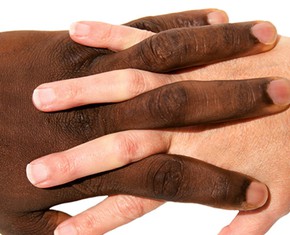The views expressed in our content reflect individual perspectives and do not represent the authoritative views of the Baha'i Faith.
Do you think of yourself as a globalist or a nationalist? If you’re not sure, take this simple quiz to find out:
- How do you feel about national borders? Should they be:
- Sealed, policed and generally impenetrable?
- De-emphasized and more easily crossed?
- If you decided to fly a flag at your home, would you choose:
- The flag of your country?
- A flag with a photo of the Earth from space?
- Do you think of yourself as a citizen:
- Of the nation you live in?
- Of the world?
Pretty obvious, isn’t it? If you answered “a.” to these three questions, you’re probably a nationalist; and if you answered “b.” you’re more likely a globalist. All of these questions basically come down to one central emotional one: what do you love and feel loyal to more, your country or the Earth?
But before we go any further with this kind of categorization, let’s define our terms—or at least let Webster’s Dictionary do it for us:
naˊtionˑalˑism n. 1. devotion to one’s nation, patriotism
globˊalˑism n. 1. a policy, outlook, etc., that is worldwide in scope
 Seems simple, doesn’t it? Well, it may seem that way, but the stark choice between nationalism and globalism has become a major flash point in the planet’s complex political life lately. In many if not most countries around the world, a fierce debate rages: should we do what’s best for our country, or what’s best for the world? Should we care more about the citizens of our own nation, or everyone, regardless of where they were born? Should we privilege those who are citizens, or should we de-emphasize national citizenship in favor of a more inclusive view of all people as world citizens? Should we retain our national identities as Spaniards, Russians, Brazilians, Liberians, Americans—or should we adopt a more universal, global identity that transcends our purely national origins?
Seems simple, doesn’t it? Well, it may seem that way, but the stark choice between nationalism and globalism has become a major flash point in the planet’s complex political life lately. In many if not most countries around the world, a fierce debate rages: should we do what’s best for our country, or what’s best for the world? Should we care more about the citizens of our own nation, or everyone, regardless of where they were born? Should we privilege those who are citizens, or should we de-emphasize national citizenship in favor of a more inclusive view of all people as world citizens? Should we retain our national identities as Spaniards, Russians, Brazilians, Liberians, Americans—or should we adopt a more universal, global identity that transcends our purely national origins?
Entire elections, policy directions, huge economic expenditures and the lives of billions of people all hinge on these enormously important questions today. Refugee crises, environmental crises and even crises in international relations between countries depend on how we answer them.
Tremendous forces are at work in the world in favor of each position. Nationalist forces still dominate planetary political structures, and the so-called “developed” nations—the most prosperous countries, usually termed the global North, dominate the poorer and “under-developed” nations, termed the global South. Nations from the global North—the United States, Japan, the European Union and Russia, among others—tend to possess more wealth, more power and more influence. Nations from the global South—India, Indonesia, most South American and African countries—tend to have less wealth, less power and less influence, even though they have larger aggregate populations than the developed countries.
Globalist forces, however, increasingly pose a challenge to traditional nationalist views. Because the world has transformed itself during the past century from a vast planet to a neighborhood; because social relations between the Earth’s peoples increasingly cross national borders; because travel and transportation and communication and the diffusion of meanings and values through the internet and popular global culture has increased exponentially; the purely nationalistic concepts of citizenship and patriotism and absolute allegiance to a single country have begun to dwindle.
Baha’is believe that these titanic global changes mark a major turning point in human history. Right now, in this century, we are in the midst of a pivotal alteration in the way we see ourselves and the world—and that alteration will have an enormous impact on the future of the human race.
All humanity, the Baha’i teachings say, must eventually unify under one banner—the banner of global unity:
We desire but the good of the world and the happiness of the nations…. That all nations should become one in faith and all men as brothers; that the bonds of affection and unity between the sons of men should be strengthened… Yet so it shall be; these fruitless strifes, these ruinous wars shall pass away, and the ’Most Great Peace’ shall come…. Yet do We see your kings and rulers lavishing their treasures more freely on means for the destruction of the human race than on that which would conduce to the happiness of mankind…. These strifes and this bloodshed and discord must cease, and all men be as one kindred and one family…. Let not a man glory in this, that he loves his country; let him rather glory in this, that he loves his kind…. – Baha’u’llah, The Proclamation of Baha’u’llah, p. 1.
So in this series of essays, we’ll examine the contemporary battle between nationalism and globalism, and explore the Baha’i teachings on the subject. We’ll look at what the Baha’i teachings envision for a unified, post-nationalistic world, and see what they mean when they call for the unity of all nations in one global system of governance. Mostly, though, we’ll elucidate the reasons why you should privilege your love of humanity over your love of country, and why the Earth’s future depends on us all becoming globalists.
You May Also Like
Comments

















would lead to the right balance,
I think. If we are guided by a general
love of man and respect for the environment, all the economic and
political framework would take shape
to fit. Global consciousness would
lead to global justice; good
stewardship of resources would
encourage local self-sufficiency.
Then everybody's rights would be
ensured and the Earth protected.
Tribe unity
City-State unity
Country unity
Global unity
We've all the time been learning how to live together in its level and seems to be very difficult for the human kind to learn.